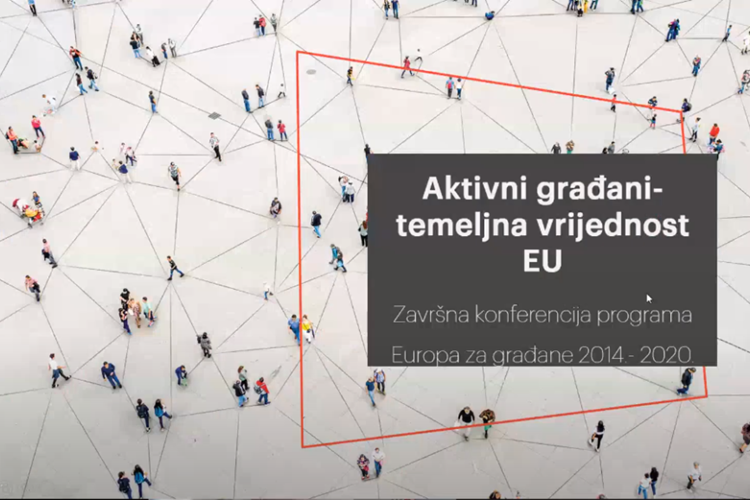- Published: 02.04.2021.
The online conference Active Citizens - a fundamental value of the European Union marked the end of the Europe for Citizens 2014-2020 programme
On the occasion of the end of the Europe for Citizens 2014-2020 programme, Government Office for Cooperation with NGOs as the Contact point of the Program has organized the online conference “Active Citizens - fundamental value of the European union, on 30 March 2021.
The event was opened by the Director of the Office for NGOs, Ms Helena Beus pointing out the importance of the Europe for Citizens programme in strengthening the sense of the European identity and belonging to the EU through networking and sharing knowledge, experience tradition and vision of the progress. Ognian Zlatev, Head of the European Commission Representation in Croatia presented in his introductory speech the joint initiative of the European Commission, the EU Parliament and the Council, that is focused on encouraging the citizens for active shaping of the European future - the Conference on the future of the Europe.After introductory speeches Željka Markulin from the National Contact Point of the Government Office presented the main achievements of the Europe for Citizens program 2014-2020 in Croatia. Jutta Koenig-Georgiades from the General Directorate for Justice and Consumer Protection of the European Commission outlined the basic elements of the future EU program Citizens, Equality, Rights and Values, which in the new programming period 2021-2027 will carry out the activities of the current Europe for Citizens Program.
Participants were then shown a short promotional film “Active Citizens for an open and tolerant EU” (available at https://www.youtube.com/watch?v=WlraHyaNXlA), in which some of the Program beneficiaries talk about their experience in project preparation and implementation. Also, a brochure with information about the Europe for Citizens 2014-2020 program and its implementation in the Republic of Croatia can be found here (https://www.youtube.com/watch?v=WJWAYbhfVBo), as well as animation of projects ( https://www.youtube.com/watch?v=CN5JfWGR1lQ) of all Program beneficiaries on the map of Croatia.
In the second part of the conference, a panel discussion Active Citizens - the fundamental value of the European Union was held. It was attended by Toma Šutić, a member of the Cabinet of the Vice President of the European Commission for Democracy and Demography, Ms. Dubravka Šuica, Željka Markulin in front of the National Contact Point of the Europe for Citizens program of the Government Office for NGOs, M.Sc. Krševan Antun Dujmović from the Institute for Development and International Relations, Tanja Tešija from the MI Association, one of the beneficiaries of the Europe for Citizens program and Ph.D. Dražen Šimleša, coordinator of the European Network for Solidarity Economy (RIPESS). The discussion, moderated by Saša Šegrt from the Office NGOs, provided an overview of today's space for civil action and civil society at EU level and an opportunity to exchange views on today's values of the European Union and their preservation.
Referring to the results of a special Eurobarometer on the future of the Europe, which showed that as many as 92% of EU citizens want their votes to be "more respected in decision-making on the future of Europe", Toma Sutic presented some activities and tools of the European Commission aimed at encouraging citizens to become more involved in decision-making processes: the Conference on the Future of Europe, a multilingual digital platform for proposing ideas and leading debates, and the European Citizens' Initiative 2.0. Krševan Antun Dujmović emphasized the importance of timely involvement of civil society in decision-making processes and commented on the attitudes and role of young people in creating a common European future. Tanja Tešija presented the long-term work of the MI Association on building social cohesion by encouraging cooperation, solidarity and involvement of citizens at the local and national level. She emphasized the importance of solidarity, especially in times of crisis, pointing out the need to establish a crisis fund that would enable urgent action in crisis situations and facilitate crisis volunteering. Dražen Šimleša spoke about the advantages of the solidarity economy, especially in times of crisis, noting that cities and regions in which the social and solidarity sector is strong have proved more resilient to the crisis. He also stressed the importance of co-creating public policies through joint action of different sectors, and especially the importance of the Social Economy Action Plan, expected during 2021, in which the Commission will adopt new measures to improve the social economy, social innovations that encourage inclusion and participation.
At the end of the panel discussion, Željka Markulin presented the instruments that will be available to the non-profit sector in the new financial period and enable work on creating resilient and sustainable communities. The conference brought together representatives of the Office of the Deputy Prime Minister, the Ministry of Foreign Affairs, Regional Development and EU Funds, the Ministry of Justice and Administration and the Office of the Ombudsman, as well as numerous representatives of non-profit organizations and local governments, many of which implemented activities financed through the Europe for Citizens program in the past period.
You can watch a recording of the conference at the link. (https://www.youtube.com/watch?v=Au5CHt84wiM)
